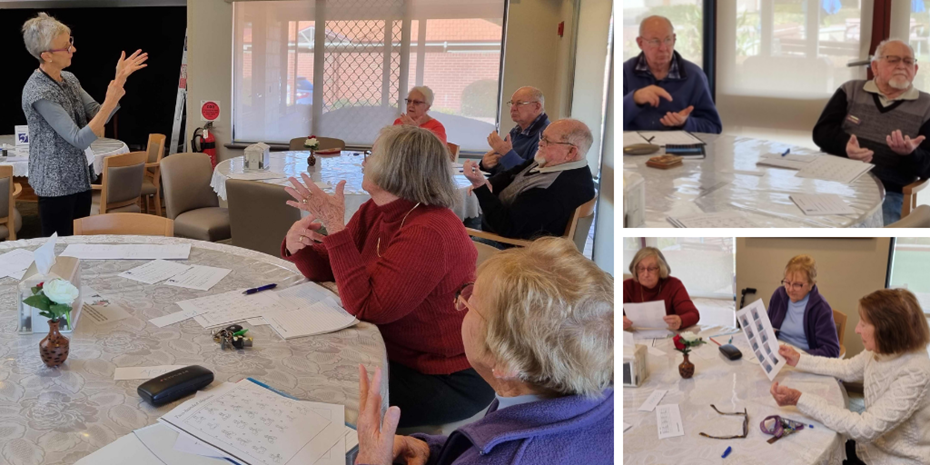

A new project to teach simple hand signs in aged care and retirement villages has the potential to enhance communication, reduce social isolation and improve quality of life.
The Qsign project is a collaboration between Better Hearing Australia (WA), Edith Cowan University (ECU), and Brightwater Care Group.
It aims to help overcome the hearing, language and communication issues among older people that make interactions difficult.
In conjunction with aged care staff and residents 20 signs considered most important for health, safety and family interactions have been identified. Word signs include eat, sleep, medicine, pain and stop.
ECU Honorary Senior Research Fellow Dr Barnard Clarkson said the signs chosen have a strong Auslan influence and are easy to mimic and replicate.
“Initially the signs will be taught in person. We are also planning training videos and interactive graphic displays, and even personal card copies, that we hope will suit a wide range of communicators,” Dr Clarkson said.
Chair Better Hearing Australia (WA) Barbara Alcock said as well as learning the signs participants would be encouraged to do one simple thing to improve their communication—face each other while speaking.
“Encouraging people to look at each other while they’re speaking aids lipreading, hearing and reading of body language,” she said.
Impact of COVID-19
Dr Clarkson said the pandemic had made communication challenges in aged care even harder.
“These have been made worse during COVID-19 when staff are wearing masks preventing lipreading and socially distancing which reduces the prospect of clear communication.
“We hope that by learning to recognise these simple hand signs communication and quality of life will be improved,” Dr Clarkson said.
Benefits for residents, staff and family
Dr Clarkson said being able to recognise these key signs will not only be critical for around 50 per cent of aged care residents with significant hearing issues, but helpful for all clients, regardless of ability.
“We expect the 20 keyword signs in conjunction with the spoken language will be advantageous for staff communication in reducing frustration too”.
“We can also foresee families adopting some signs from our displays and videos – confirming and reinforcing the value of learning signing and hopefully improving the quality of life for our elders,” Dr Clarkson said.
Brightwater Care Group CEO, Jennifer Lawrence, said Brightwater was always looking for ways to improve the lives of vulnerable Western Australians.
“We are excited to be piloting the program with some of our retirement village residents and if successful, we can certainly see how this could be adapted for our aged care home,” she said.
“Many of the people we support have hearing issues and by teaching them and our staff some key and easy to learn signs, it could make an enormous difference in their ability to communicate easily.”
The next stage in the project is to trial the set of approximately 20 signs with different groups of elders in a variety of settings.
“We expect this project could have important benefits for aged care facilities across Australia,” Dr Clarkson said.


